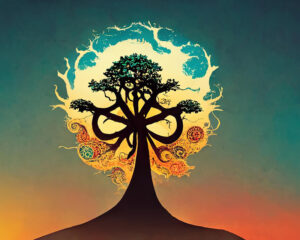An applicant interviewed today for a place on ICPPD’s BA in holistic counselling and psychotherapy said “I researched other courses and websites and everything and all of them was like a school rather than a community. In researching ICPPD I got a good feeling, I felt I was meeting people like me who had a similar approach to learning and to therapy.”
Another applicant, when asked if they had any further questions replied “I attended the Information Evening and I felt there was encouragement, and understanding for the struggles, and the personal journey of being human. I really liked hearing people’s stories and how they transitioned and their experience of being an adult learner and what was entailed in becoming a counsellor and psychotherapist.”
As a psychotherapist and educator, I am asked what is ‘holistic’ and how do I see the holistic ethos embodied at ICPPD. This is not an easy question for me to answer. Like the quotes above there is a sense of something, a knowing of something that is hard to articulate and is not even tangible. It is often described as a feeling or an experience, a mystery and magical energy.
ICPPD embraces the three-fold notion of the concept of ‘holistic’ – namely that holism is a comprehensive way of viewing the human person, body mind and spirit and the interrelatedness encompassed, it can be used to describe a way of growth for the person.
In terms of providing health care, the use of the term “holistic” dates to the time of Hippocrates, over 2,500 years ago. Believing it was insufficient to focus on one aspect of a person, Hippocrates emphasised the importance of establishing equilibrium within individuals, viewing the person as a whole being made up of many parts working in performance with one another.
One of the central figures in modern western philosophy, Descartes, R. whose central contribution is summed up in the statement – I think therefore I am – and one of the unintended offshoots of this contribution was the division of the human person into parts i.e., mind and matter, cognition and being. The holistic ethos at ICPPD has as its starting point the very opposite of cartesian thinking (Cartesianism refers to a way of thinking that accepts dualisms—supposedly oppositional pairs of concepts like mind/body, good/evil, and nature/culture—rather than a more integrated or fluid way of understanding the world). On the concept of being Marcel (1949) argues that “A really alive person is not merely someone who has a taste for life, but somebody who spreads that taste, showering it, as it were, around him; and a person who is really alive in this way has, quite apart from any tangible achievements of his, something essentially creative about him.”
This emergent holistic perspective, according to education theorist Ron Miller (1990) dissolves the traditional dichotomies between mind and body, between spirit and matter…. The central tenet of the holistic worldview — and this is the basis for the term holistic— is its emphasis on the integration of the inner qualities of human life with the outer physical, social world.
The aim of holistic counselling and psychotherapy is to appreciate the complexity and context of the unique lived experience of each person including experiences related to “developmental and acute trauma, social privilege, bias, and oppression, as well as issues pertaining to spiritual meaning, purpose, vision, creativity, and non-normative states of consciousness” (Maller et al. in Dunn, 2019).
For a holistic counsellor/psychotherapist to gain the confidence and expertise to work with clients from a holistic perspective of body, mind and spirit, the focus is on the therapist themselves and on the theoretical element of training. The need for the therapist to have engaged in personal development, self-awareness, personal therapy, journaling, group work, transpersonal training, somatic training requires the therapist to engage deeply with their own process and this can be seen as an impediment where a trainee would like a ‘more academic approach’ to learning or where a training programme is not designed specifically to meet these needs.
The holistic approach is anchored at its core in the unity of the human being. The starting point is a holistic approach is not a dualistic approach, not a collection of parts but multidimensional view of the person. An appreciation of the sense of awe and wonder of the human person and that there may be dimension still to be discovered. All programmes at ICPPD and their underlying philosophy, the learning outcomes, various modules, experiential methods of learning, reflective practice, clinical placements, and research focused, and the narrative and ethnographic genres contribute to a unity of purpose in the education and development of learners undertaking these programmes.
Feedback last week from clinical practice placement managers highlighted the distinctive roundedness, comprehensiveness, and holistic tenor of the emerging graduates and past graduates of ICPPD. This is one of the distinctive contributions of the professional effect of the education and development of counsellor/psychotherapist at ICPPD.
The education milieu created by tutors and learners is one of personal openness and discovery through creative and dynamic learning experiences. Learners are immersed in a holistic approach from the outset. The concept of the human being, shared with learners in various modules is not simply that there are many parts to the person, but it is the life-giving interaction of these dimensions.
This is evidenced in the extensive range of modules reflecting their various views of the human person, some focus on the past, others the present, others again focus on the future. The carefully selected modules, while taught as distinct units of learning are brought together in explicitly identified overarching themes, highlighting the distinctive multidimensional and holistic nature of the programme itself.
“The facilitation of significant learning rests upon certain attitudinal qualities which exist in the personal relationship between the facilitator and the learner.” (Carl Rogers).








